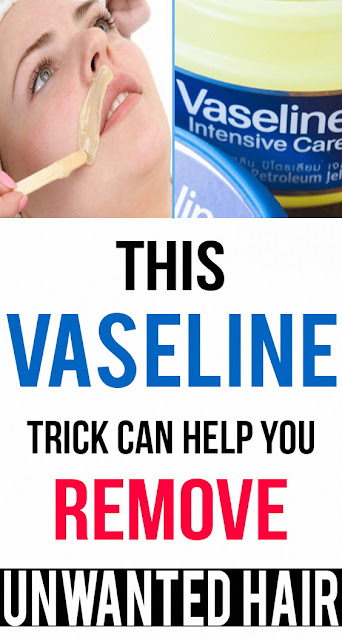Vaseline is a triple-filtered substance, which ensures it is free from impurities and safe to use. While Vaseline is the name, the product is actually petroleum-jelly based product. In the past several years, we’ve seen Vaseline, or petroleum-jelly, make its way to skin creams, soaps, cleansers, deodorants, lotions, and many more skin and hair products.
There are so many ways you can use Vaseline. For example, mothers use it to prevent diaper rash. You can also use it to protect yourself from minor cuts and burns and to soften your skin.
The main benefit of Vaseline is that it helps lock in moisture, which is why many people use it for dry and cracked skin.
Today, however, we will talk about a simple trick for removing unwanted hair on your body. And yes, you can use this trick for hair anywhere on your body.
How to use Vaseline to remove unwanted hair?
In most cases, people use this trick to remove hair on their armpits. Other problematic areas include hair on the upper part of the lips, pubic area, and the legs.
You will need only four simple ingredients for this trick. And we can surely bet you have all of them in your kitchen cabinet.
Here are the ingredients:
- 1 tablespoon of gram flour
- ½ tablespoon of turmeric powder
- 3 tablespoons of milk powder
- ½ teaspoon of Vaseline
How to do it?
- Start by mixing all the ingredients except for Vaseline in a mixing bowl. Make sure you have a smooth and thick paste
- Add half a teaspoon of Vaseline, and continue mixing
- Apply the paste on your skin in direction of hair growth in problem areas
- Leave the paste to dry completely, it usually takes 5 to 10 minutes
- Once the paste is dry, remove in the opposite direction of hair growth. Wash your skin with warm water afterward, and that is it
- You can repeat the process on a daily basis, which will save you a trip to the beauty salon. The trick is especially handy for women who hate hair on their upper lips, but they do not want to go to the salon for few hairs
Benefits of Vaseline
As mentioned previously, Vaseline can be used for a number of ways. This trick will help you remove unwanted hair, but also provide some benefits.
For example, using Vaseline to remove unwanted hair from your skin will also soothe and moisturize your skin. You want smooth and radiant skin?
Apply Vaseline after a shower, and it will prevent your skin from drying out. For ladies with cracked heels, soak your feet in warm water and add some salt.
Towel dry your feet, and then apply petroleum jelly and clean cotton socks.
With that in mind, here is a quick breakdown of all Vaseline benefits:
- Heal minor skin scrapes and burns
- Adds moisture to your skin
- Prevents diaper rash
- Removes makeup, and it is safe to use in the eye area
- Save split ends and add shine to your hair
- Prevent skin stains from hair dye or nail polish
- Use it as a lube for stuck objects (but not for sexual intercourse)
- Preserve perfume scents by using Vaseline as a base for your perfume lasts longer
Potential side effects of using Vaseline
Petroleum-jelly has many benefits. However, what you need to remember is that it is for external use only. Do not eat or insert petroleum jelly. Avoid using it as a vaginal lubricant or for masturbation.
Potential side effects of using petroleum jelly include:
- Allergies, as some people are more sensitive and they can develop allergies when using petroleum-jelly derived products
- If you do not allow the skin to dry or clean the skin properly before applying Vaseline, you can cause fungal or bacterial infections
- Some people report breaking out after using petroleum jelly on their skin. The product can clog your pores, so make sure you clean your skin before you apply the product
- Petroleum jelly should not be used around the nose area in children, as it can increase aspiration risks

